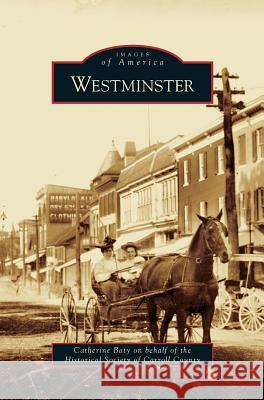Westminster » książka
Westminster
ISBN-13: 9781531643324 / Angielski / Twarda / 2009 / 130 str.
William Winchester established Westminster in 1764 by laying out 45 town lots along the main road to Baltimore. The lots sold quickly, and soon there was a small but thriving community. When Carroll County was established in 1837, Westminster was named the county seat, bringing government officials, judges, lawyers, and visitors to the town. Hotels, homes, and stores sprang up to serve the influx of new residents and visitors. The Western Maryland Railway reached Westminster in 1861. In 1863, Confederate general J. E. B. Stuart's cavalry arrived en route to Gettysburg and battled a small detachment of Union cavalry responsible for guarding the vital railroad link to Baltimore. After Stuart's troops continued on to Pennsylvania, Union troops established an important depot, with supplies arriving from Baltimore for transport to the battlefield and wounded soldiers returning to be cared for in Westminster's hotels, churches, and homes. Westminster prospered throughout the 19th and 20th centuries as it became the center of an industrial and agricultural community.
William Winchester established Westminster in 1764 by laying out 45 town lots along the main road to Baltimore. The lots sold quickly, and soon there was a small but thriving community. When Carroll County was established in 1837, Westminster was named the county seat, bringing government officials, judges, lawyers, and visitors to the town. Hotels, homes, and stores sprang up to serve the influx of new residents and visitors. The Western Maryland Railway reached Westminster in 1861. In 1863, Confederate general J. E. B. Stuarts cavalry arrived en route to Gettysburg and battled a small detachment of Union cavalry responsible for guarding the vital railroad link to Baltimore. After Stuarts troops continued on to Pennsylvania, Union troops established an important depot, with supplies arriving from Baltimore for transport to the battlefield and wounded soldiers returning to be cared for in Westminsters hotels, churches, and homes. Westminster prospered throughout the 19th and 20th centuries as it became the center of an industrial and agricultural community.











